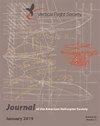Fidelity Enhancement of a Multirotor Dynamic Inflow Model via System Identification
IF 1.4
4区 工程技术
Q2 ENGINEERING, AEROSPACE
引用次数: 0
Abstract
Multirotor analytical dynamic inflow models in the literature, such as pressure potential superposition inflow model or velocity potential superposition inflow model (VPSIM), have been shown to capture the fundamental inflow interference effects between the rotors. Some of the differences in inflow predictions seen between these analytic models and high-fidelity wake models are attributed to missing real flow effects such as wake distortion, contraction, decay, swirl, etc. As such, correction terms are needed in the analytically derived multirotor finite-state inflow models, because of the potential flow and rigid wake assumptions they are based on, in order to capture some of the missing real flow effects in them. This paper develops a systematic methodology for arriving at the needed correction terms in the VPSIM through comparisons of its inflow predictions with those of a viscous vortex particle model (VVPM). Also, a procedure is developed to assess the relative importance of individual real flow effects and the associated corrections needed for improving the overall fidelity of the VPSIM. The developed methodology is applied to the Harrington coaxial rotor using its geometric and aerodynamic data from the literature. It is shown that the addition of swirl coupling correction terms to the VPSIM significantly improves its correlations with the VVPM. Further, it is shown that the required corrections are reasonably insensitive to thrust sharing ratio conditions between the rotors.多转子动态流入模型的系统辨识保真度增强
文献中的多转子分析动态入流模型,如压力势叠加入流模型或速度势叠加入流模型(VPSIM),已经被证明可以捕捉转子之间的基本入流干涉效应。这些分析模型与高保真尾流模型之间的入流预测的一些差异归因于缺少实际流动效应,如尾流畸变、收缩、衰减、旋流等。因此,在解析导出的多转子有限状态流入模型中需要校正项,因为它们是基于势流和刚性尾迹假设,以便捕捉其中一些缺失的实际流动效应。本文提出了一种系统的方法,通过将VPSIM的入流预测与粘性涡旋粒子模型(VVPM)的入流预测进行比较,得出VPSIM所需的校正项。此外,还开发了一个程序来评估个别实际流动效应的相对重要性以及提高VPSIM整体保真度所需的相关校正。开发的方法是应用到哈林顿同轴转子利用其几何和空气动力学数据从文献。结果表明,在VPSIM中加入旋流耦合校正项后,VPSIM与VVPM的相关性显著提高。进一步表明,所需的修正对转子之间的推力分担比条件不敏感。
本文章由计算机程序翻译,如有差异,请以英文原文为准。
求助全文
约1分钟内获得全文
求助全文
来源期刊

Journal of the American Helicopter Society
工程技术-工程:宇航
CiteScore
4.10
自引率
33.30%
发文量
36
审稿时长
>12 weeks
期刊介绍:
The Journal of the American Helicopter Society is a peer-reviewed technical journal published quarterly (January, April, July and October) by AHS — The Vertical Flight Society. It is the world''s only scientific journal dedicated to vertical flight technology and is available in print and online.
The Journal publishes original technical papers dealing with theory and practice of vertical flight. The Journal seeks to foster the exchange of significant new ideas and information about helicopters and V/STOL aircraft. The scope of the Journal covers the full range of research, analysis, design, manufacturing, test, operations, and support. A constantly growing list of specialty areas is included within that scope. These range from the classical specialties like aerodynamic, dynamics and structures to more recent priorities such as acoustics, materials and signature reduction and to operational issues such as design criteria, safety and reliability. (Note: semi- and nontechnical articles of more general interest reporting current events or experiences should be sent to the VFS magazine
 求助内容:
求助内容: 应助结果提醒方式:
应助结果提醒方式:


